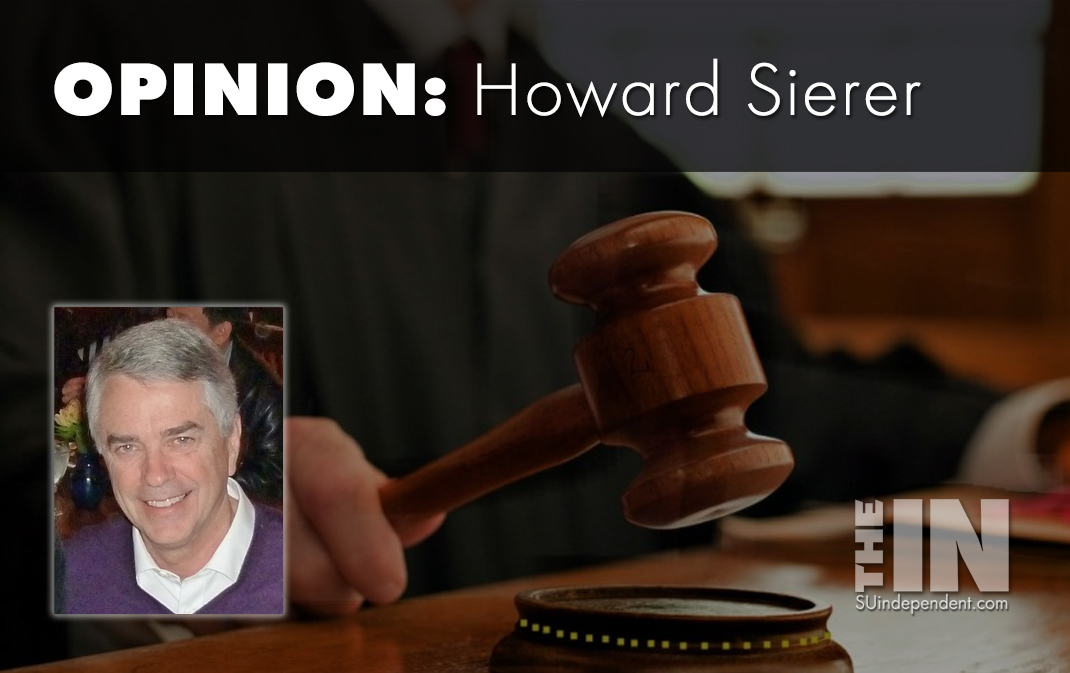
Reign of the Judges
– By Howard Sierer –
“In those days there was no king in Israel, but every man did that which was right in his own eyes.” Judges 17:6
Rephrasing that Old Testament verse from the Book of Judges for our times: “In these days there is no settled law in the U.S., but every judge does that which is right in his own eyes.”
Congress enacts laws, the president executes them and judges render decisions based on those laws. That system of checks and balances, carefully crafted by the Constitution’s drafters, has been eroded over the last 70 years.
Congress should be the institution that most directly reflects the will of the people. But Congress has become increasingly polarized as the country became sorted into the geographic and political hothouses we know as red and blue states.
As a result, far too many Senators and Representatives are in “safe” seats with their only re-election risk coming during primaries from more extreme challengers from within their own party. Hence, any hint of legislative compromise with the other party puts them in danger.
Difficulty in reaching compromises has made Congress especially ineffective in addressing the increasing number of difficult social and moral issues that have come to public attention. The first of these followed World War II: racial segregation.
African-Americans made major contributions to the nation’s war effort and the armed forces were desegregated by President Truman’s executive order. Despite this modest step and segregation’s obvious injustices, Congressional action continued to be thwarted by Southern Democrats.
The wall protecting segregation was breached with the Supreme Court’s 1953 Brown v. Board of Education decision, eliminating in a stroke the infamous “separate but equal” segregation of public schools throughout the country.
So began the reign of the judges.
By addressing an egregious societal issue, one that could – and undoubtedly should – have been addressed instead by Congressional legislation, the Court opened the door to judicial remedies for almost any perceived societal injustice.
By far the most famous of these issues is the still-controversial 1973 Roe v. Wade Supreme Court decision making abortion a law of the land. Second on the Supreme Court’s controversial decision list is Obergfell v. Hodges, making same-sex marriage likewise a law of the land.
I use the phrase “law of the land” to emphasize that in both cases, and many others of lesser repute, the courts have been used to legislate nationwide policies that clearly could and should have been debated and enacted by politically accountable, elected representatives.
Roe v. Wade is illustrative. The Supreme Court’s ruling rests on an earlier opinion by Justice William O. Douglas conjuring up a “right to privacy” in Griswold v. Connecticut. That case involved contraceptives and certainly wouldn’t be controversial today.
In his ruling, Douglas opined that “specific guarantees in the Bill of Rights have penumbras, formed by emanations from those guarantees that help give them life and substance.” In other words, he made up a new right, not included in the Bill of Rights.
His judicial discovery of “penumbras, formed by emanations” left few limits to the reach of judicial power. The right to privacy became the Court’s basis for its ruling in Roe v. Wade.
Today’s defenders of unfettered abortion rights may be surprised by liberal icon Ruth Bader Ginsburg’s opinion on Roe. In a 1992 law review article, she called Roe’s scope “breathtaking” and asked whether more “measured motions” would have been preferred.
She questioned why the Court had chosen to “fashion a regime blanketing the subject, a set of rules that displaced virtually every state law then in force. Would there have been the 20-year controversy we have witnessed?”
Ginsburg’s call for judicial restraint has gone unheeded.
With Roe as an example, supporters of an increasing number of new-found “rights” ranging from same sex marriage to gender identity to those of illegal immigrants, turned to litigation rather than legislation. While Congress can decline to address an issue, courts cannot. Even though they may move slowly on occasion, nonetheless they must act.
Acquiescing to this shift in power, Congress has essentially abandoned its legislative primacy on social issues to the courts. Much better to praise or blame the courts for legislation disguised as rulings on sensitive social and moral issues than be held accountable for a yea or nay by voters and political opponents back home.
This trend is clearly undemocratic, relying ultimately on five unelected justices on the Supreme Court.
New York Times opinion columnist Russ Douthat notes that “the high court…set itself up as the arbiter of America’s major moral controversies, removing from the democratic process, not just debates about sex and marriage and school prayer but life and death itself.”
My next column will address several realistic measures that would help re-establish the proper balance between Congress and the courts in our democracy.



